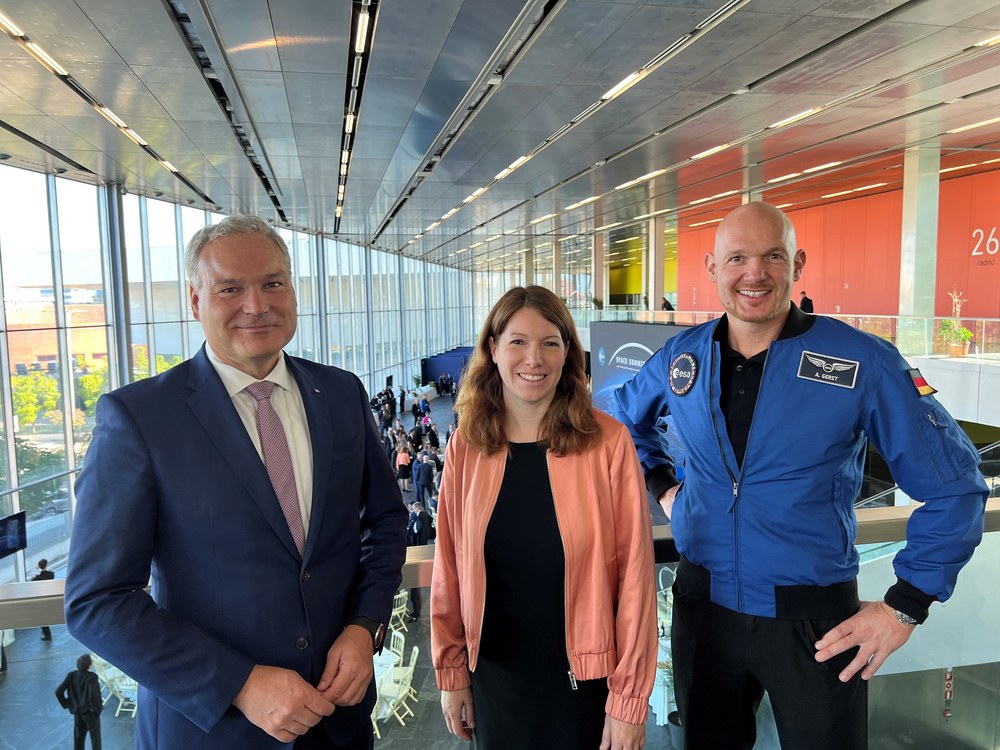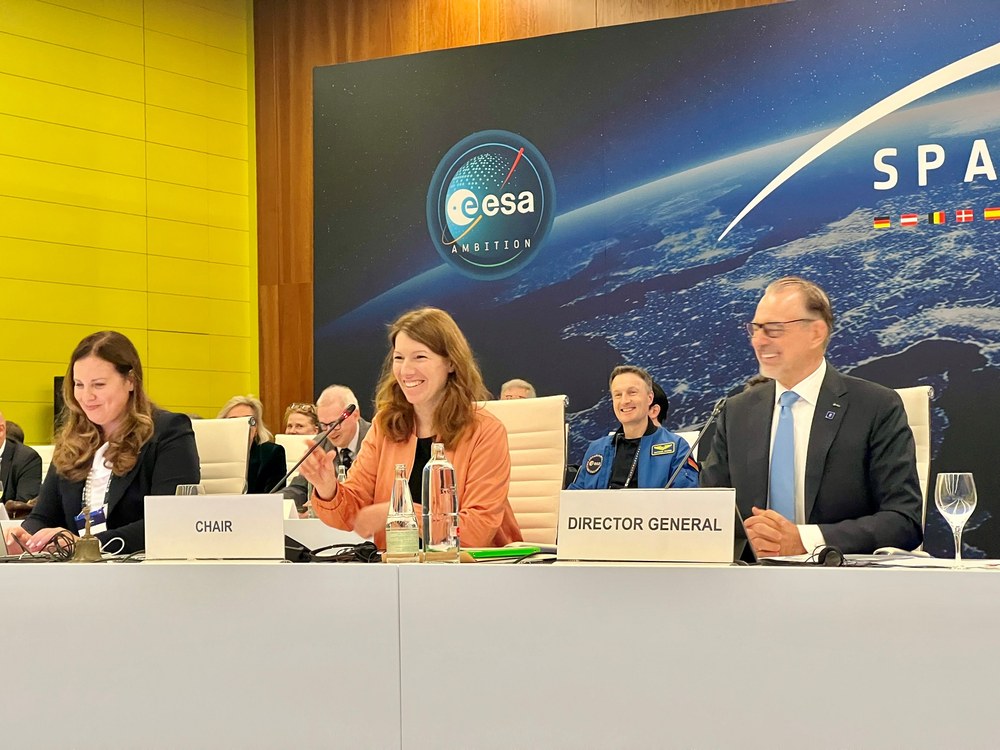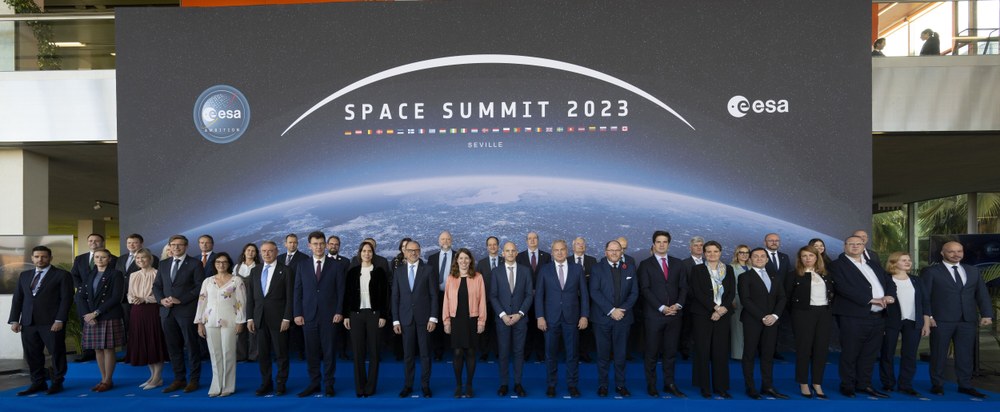More sustainability and additional competition for European spaceflight



- One year after the ESA Council Meeting at Ministerial Level in Paris (France), ministers and government representatives from the 22 ESA member states and representatives of the European Commission are meeting in Seville, Spain, on 6 and 7 November 2023 for the second Space Summit.
- Germany currently chairs the ESA Council and has prepared this summit under the leadership of Spain (EU Council Presidency) and in close coordination with ESA and its member states as well as the European Commission.
- The focus is on adopting a resolution that strengthens a sustainable space sector. This will address climate protection, promote sustainability and security in space, restore autonomous European access to space and at the same time enable a paradigm shift towards a competitive next generation of launchers. It will also set the path for commercialisation in exploration.
- Focus: European spaceflight, space policy, exploration
Space technologies and applications have become an integral part of everyone's lives and can contribute in many ways to solving global challenges. This means that spaceflight encompasses dimensions and relevance in climate policy, industrial policy and security policy. At the same time, the framework conditions for space activities and the space sector itself are changing at a rapid pace.
At the European Space Summit on 6 and 7 November 2023 in Seville, Spain, the 22 European Space Agency (ESA) member states agreed on a resolution focusing on green and sustainable spaceflight, independent, reliable and internationally competitive access to space, and new ESA procurement strategies to make cooperation between ESA and industry more commercial and service based.
Focus on innovation and competition
"Seville sends out a strong signal for the future of European spaceflight. With the 'European Launcher Challenge', we are focussing on competition and innovation in launchers. This will be a milestone for Europe's access to space. I am delighted that during the German Presidency of the ESA Council of Ministers, we are jointly breaking new ground for a strong European space sector," said Anna Christmann, a member of the Bundestag and Federal Government Coordinator of German Aerospace Policy. Christmann represented the German government in Seville and chaired the ESA Council Meeting on 6 November together with ESA Director General Josef Aschbacher.
A breakthrough has been achieved in Seville with regard to the European launcher market. The 'European Launcher Challenge' initiated by Germany paves the way for a more efficient future launch sector. "We have thus achieved a paradigm shift. We want to open up the market to competition from commercial launchers and thus achieve greater cost effectiveness and resilience. After all, we can only become independent and competitive in Europe if we contrast the approaches of the past with a new vision," explained Walther Pelzer, DLR Executive Board Member and Director General of the German Space Agency at DLR. Pelzer prepared the German positions for the conference with his team in Bonn and coordinated them with the German government. "The joint implementation of the 'European Launcher Challenge' is the decisive step in this direction and should now be prepared for the next Council Meeting at Ministerial Level in Germany in 2025," Pelzer continued.
The ESA member states also pledged the necessary support for the imminent first launch of Ariane 6 and the continued use of Vega-C as an integral part of the European launcher family for institutional and commercial launches.
Focus on green and sustainable spaceflight
In addition, the member states supported the announcement of an international 'Zero Debris' charter, which aims to minimise space-related emissions and space debris and strengthen sustainability. At the informal ESA-EU Council on 7 November, a declaration will also be adopted that emphasises the benefits and importance of spaceflight for European climate targets as well as the commercial potential of the European space sector.
"Promoting climate protection and the use of clean technologies that cause little to no greenhouse gas emissions is a top priority for Germany. Space-based data and services are a crucial piece of the puzzle here. Without our activities in space, we would not be able to systematically track climate change and respond effectively to the climate crisis. Green spaceflight also includes the issue of sustainability in space. We agree within the ESA member states that we must specifically expand and deepen these priorities if we want to meet our own goals, the Paris Climate Agreement and the EU Green Deal," Walther Pelzer emphasised.
Focus on commercialisation and exploration
The second key topic – ESA as a driver for Europe's future in space and the modernisation of the implementation of its programmes – covers the issue of secure and autonomous access to space as well as the next steps in space exploration based on commercialisation, service-based approaches and competitive procurement models. At the request of many ESA member states, including Germany, there should be preparatory studies for a cargo service in Low Earth Orbit (LEO). Low Earth orbit extends to an altitude of approximately 2000 kilometres, where most satellites and the International Space Station ISS are located. New procurement approaches are also to be established here, similar to the 'European Launcher Challenge'. To this end, a commercial competition is to be launched for a cargo return service in which companies from Europe can apply to deliver supplies to the ISS and bring cargo back to Earth by 2028. According to ESA, public funding for the first phases of the project has already been secured.
Downloads
- Spanish-German declaration by the joint presidencies of the informal ESA-EU meeting on the occasion of the 2023 Space Summit in Seville
- Resolution on lifting Europe's ambitions for a Green and Sustainable Future, access to Space and Space exploration
- The ESA Director General's proposal on lifting Europe's ambitions for a Green and Sustainable Future, access to Space and Space exploration
